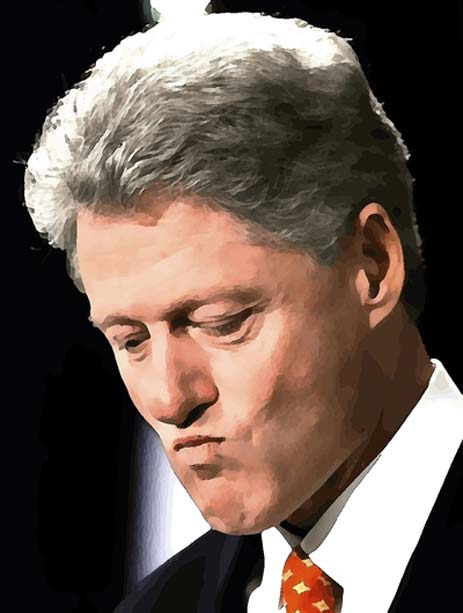
After the revelations of multiple charges of sexual harassment and assault against Hollywood mogul Harvey Weinstein set off a domino effect of accusations against other powerful men, toppling career after career, I wondered how long it would take before Bill Clinton's number came up. Now, it seems, the Clinton reckoning is here.
The controversy over Roy Moore, the Republican Senate candidate from Alabama accused of decades-old sexual assaults on teenage girls, proved the tipping point. With Republicans under fire for being slow to ditch Moore, Democrats were suddenly on the spot over their own defense of a politician beset by charges of sexual abuse.
This week, several prominent liberal pundits -- including ones who used to be strong Clinton supporters, such as Vox blogger Matthew Yglesias -- have grappled with the issue of Clinton's sexual misconduct in the 1990s. Yglesias admits Democrats were wrong to protect Clinton after the exposure of his liaison with White House intern Monica Lewinsky and his perjury in a sexual harassment lawsuit. Others have urged penance for the willingness of liberals, especially feminists, to give Clinton a pass despite multiple accusations.
There was, to be sure, plenty of feminist hypocrisy. Activists who usually insisted that low-level sexual innuendo and unwelcome date requests on the job were intolerable shrugged off much worse accusations against Clinton by former Arkansas state worker Paula Jones (indecent exposure and a request for oral sex) and former White House volunteer Kathleen Willey (unwanted kissing and groping).
Gloria Steinem penned an op-ed asserting that even if true, this did not amount to sexual harassment because Clinton took no for an answer. Other feminists argued that Jones didn't have a valid complaint since she had not lost pay or promotions. And Arkansas businesswoman Juanita Broaddrick's disturbing allegation of a hotel-room rape by then-Gov. Clinton in 1978 was largely evaded.
Even during last year's presidential campaign, when Donald Trump revived the issue as a weapon against Hillary Clinton, many liberal pundits dismissed the charges against the former president as discredited.
What to make of the current pivot? Cynically, one could argue that it's less about belated integrity or cultural shift than about convenience. In 2017, ditching Bill Clinton costs the Democrats nothing while putting them in a much better position to attack sexual misdeeds by Republicans. It may even be politically useful, as a way to pre-empt a potential Hillary Clinton comeback that many Democrats see as disastrous. Moreover, given the party's leftward drift, Clinton's legacy of Democratic centrism is one many Democrats will be only too glad to delegitimize by making Clinton a pariah.
But there is another problem. While the pro-Clinton excuses 20 years ago were opportunistic and hypocritical, the current condemnations are based on some questionable assumptions: for instance, that we should "err on the side of believing women" (as New York Times op-ed columnist Michelle Goldberg puts it) on claims of sexual harassment and assault. People who bring such charges deserve a respectful hearing but not blind faith.
Atlantic writer Caitlin Flanagan laments that feminist support for Clinton derailed the consciousness-raising about male sexual misconduct that began with Anita Hill's testimony against Clarence Thomas in 1991. But in fact, the post-Hill crusade quickly turned to repressive policing of trivial or ambiguous behavior, with horror tales of men getting fired for repeating a mildly ribald joke from "Seinfeld" at the office. The public's tolerant attitude toward the Clinton scandals was partly a backlash against such overreach.
The claims against Clinton may be worth re-examining. But we should beware of going down the path of zealotry.
Comment by clicking here.
Cathy Young, a JWR contributor since 1999, regularly appears in Reason magazine. She is a columnist for Newsday and was an occasional past contributor to the New Republic. She wrote this for The Los Angeles Times.



 Contact The Editor
Contact The Editor
 Articles By This Author
Articles By This Author